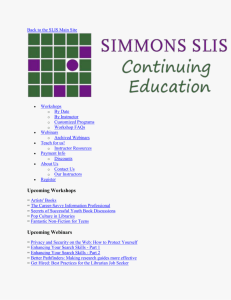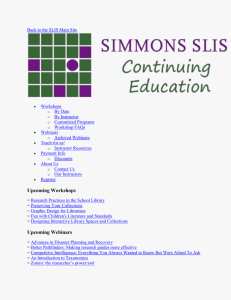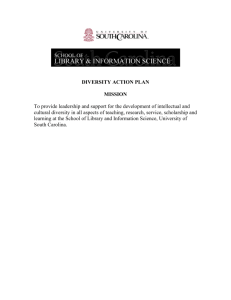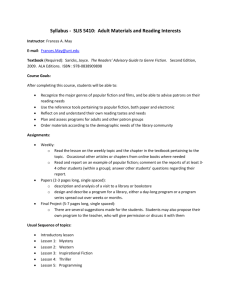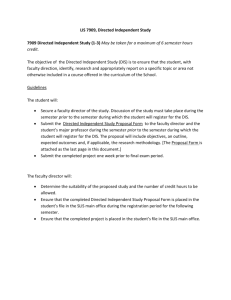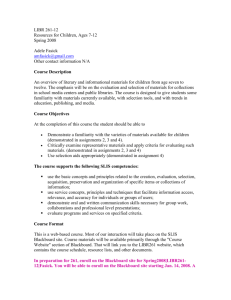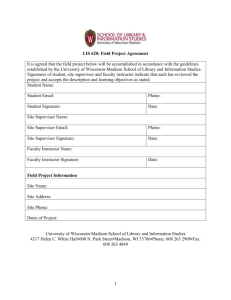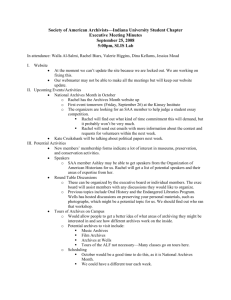Spring 2013 - School of Library & Information Studies
advertisement
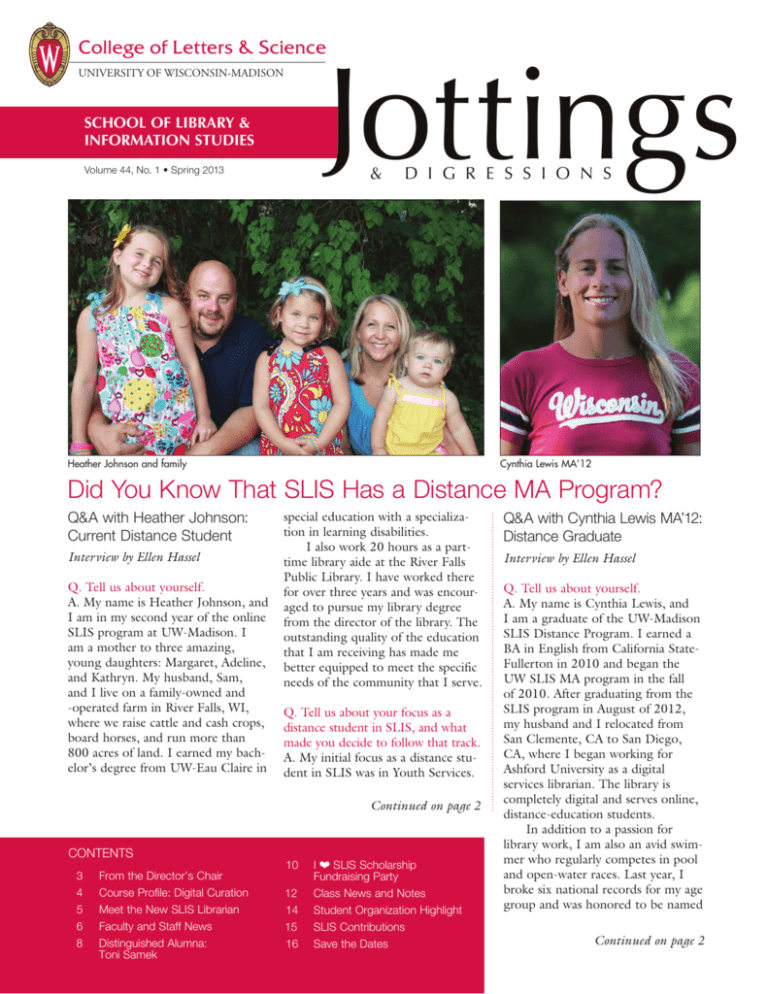
College of Letters & Science UNIVERSITY OF WISCONSIN-MADISON School of Library & Information Studies Volume 44, No. 1 • Spring 2013 Jottings & D I G R E S S I O N S Cynthia Lewis MA’12 Heather Johnson and family Did You Know That SLIS Has a Distance MA Program? Q&A with Heather Johnson: Current Distance Student Interview by Ellen Hassel Q. Tell us about yourself. A. My name is Heather Johnson, and I am in my second year of the online SLIS program at UW-Madison. I am a mother to three amazing, young daughters: Margaret, Adeline, and Kathryn. My husband, Sam, and I live on a family-owned and -operated farm in River Falls, WI, where we raise cattle and cash crops, board horses, and run more than 800 acres of land. I earned my bachelor’s degree from UW-Eau Claire in special education with a specialization in learning disabilities. I also work 20 hours as a parttime library aide at the River Falls Public Library. I have worked there for over three years and was encouraged to pursue my library degree from the director of the library. The outstanding quality of the education that I am receiving has made me better equipped to meet the specific needs of the community that I serve. Q. Tell us about your focus as a distance student in SLIS, and what made you decide to follow that track. A. My initial focus as a distance student in SLIS was in Youth Services. Continued on page 2 CONTENTS 3 From the Director’s Chair 4 Course Profile: Digital Curation 5 Meet the New SLIS Librarian 6Faculty and Staff News 8Distinguished Alumna: Toni Samek 10I ❤ SLIS Scholarship Fundraising Party 12Class News and Notes 14 Student Organization Highlight 15 SLIS Contributions 16 Save the Dates Q&A with Cynthia Lewis MA’12: Distance Graduate Interview by Ellen Hassel Q. Tell us about yourself. A. My name is Cynthia Lewis, and I am a graduate of the UW-Madison SLIS Distance Program. I earned a BA in English from California StateFullerton in 2010 and began the UW SLIS MA program in the fall of 2010. After graduating from the SLIS program in August of 2012, my husband and I relocated from San Clemente, CA to San Diego, CA, where I began working for Ashford University as a digital services librarian. The library is completely digital and serves online, distance-education students. In addition to a passion for library work, I am also an avid swimmer who regularly competes in pool and open-water races. Last year, I broke six national records for my age group and was honored to be named Continued on page 2 Heather Johnson, continued However, as I began getting into my coursework, I also added Library Management to my degree track. My background as a special education teacher has provided me with the knowledge and understanding for working with the youth population. I love the diversity and creativity that is involved with youth librarianship. I especially love the ability to connect to a person’s early reading experiences. From the management standpoint, I enjoy being a community leader and a positive role model. Q. What is your current job, and what kind of projects are you working on? A. I am currently working on the committee for River Falls Reads, which is a One Community One Book program. I am also working with the youth librarian on a YA for Adult book club that was started this fall. Q. What do you find most rewarding about your position? A. The most rewarding part of my position is working directly with the community. I am able to support early literacy activities and help individuals get access to the quality information and resources that they need. I am also part of a team of knowledgeable and friendly library staff who make coming in to work each day a positive and rewarding experience. Q. What classes or activities through SLIS have proven to be of particular use to you in your SLIS career? A. I don’t have a particular class or activity that stands out, simply because they have all been so complimentary. I have been able to build upon my coursework and apply what I have learned to create meaningful and relevant experiences. In turn, each class has then made me a more wellrounded and knowledgeable library employee. 2 Q. What are your plans for the future? A. I look forward to my internship this summer at the River Falls Public Library, where I hope to showcase the education that I have received in the Distance SLIS Program at UW-Madison. Q. What is one piece of advice you would extend to current distance students at SLIS? A. Don’t forget to thank the people who help you make it through the day. According to an African proverb, “It takes a village to raise a child.” I would like to add to that by stating that… it takes a family to raise a librarian. I would not be where I am today without the love and devotion of my family. Don’t be afraid to ask for help, but don’t forget to be gracious and say “thank you.” On a more practical and humorous note: • Learn to love your laptop and smartphone. • Be extremely disciplined with your commitment to staying current with the coursework. • Read the syllabus for each class (often). • Don’t be afraid to ask for help with your coursework. • Enjoy the discussion boards. • Learn to live without sleep. • Love the high-quality education that the Distance SLIS Program enables you to get from the comforts of your own home, at any time of the day, and in any kind of wardrobe that you choose! nnnnn Cynthia Lewis, continued Southern Pacific Masters Swimmer Female Athlete of the Year. Q. Tell us about your focus as a distance student in SLIS, and what made you decide to follow that track. A. I was initially attracted to UW SLIS because of the organic structure of the program — particularly the ability for students to construct a unique emphasis through different course combinations. My emphasis was in Digital Libraries and Reference. Because the program emphasized the technology skills and “soft skills,” such as flexibility, innovation, collaboration, and creativity, I felt prepared to work in a breadth of information environments when I graduated. Q. What is your current job, and what kind of projects are you working on? A. I currently work for Ashford University. Ashford has a physical campus in Clinton, IA and a virtual campus in San Diego. Although I didn’t plan for a career in academic librarianship, I was attracted to the idea of working in an all-digital library and felt my graduate work at UW, as well as 10 years of reference experience in public libraries, gave me a good foundation to work in an allvirtual environment. Having gone through a distance program, I also understand the challenges and rewards of online learning environments, which has allowed me to relate to the students I serve. The Ashford Library consists of a highly collaborative staff of six librarians and a library director. Our primary roles are to provide reference services to distance-education students via phone, chat, and email, and manage a growing electronic collection. We also create usable library spaces for online students and faculty through our library website and connect online classrooms to the library by embedding library instruction and research tools into highly visible and critical places in the courses. Ashford’s online student body primarily consists of adult reentry students, students in the military, and first generation college students, many of whom are inexperienced in using electronic resources and conducting research. JOTTINGS From the Director’s Chair Spotlight: Online Master’s Program Dear SLIS Friends and Alumni, Did you know SLIS has a full online master’s program? You Professor Kristin may notice a Eschenfelder, Director theme in this season’s Jottings: the SLIS online MA degree. The online master’s degree in library and information studies is a historic stage in the school’s educational offerings, so we want to describe the program and introduce some current online courses and some recent alumni to you. The online program, also known as the distance program, represents about one-quarter of the SLIS student body. It is the same degree as the campus MA, with the exact same requirements, including the practicum. In addition, the online program has a one-week residency requirement. In this residency, fondly known as “SLIS Boot Camp,” students from all over the country travel to Madison to get to know SLIS, meet the faculty, bond together as a cohort, and enjoy the August evenings on the Terrace. But some things don’t change: the SLIS online program maintains the high standards that have always been associated with the UW-Madison degree. Cynthia Lewis, continued Q. What do you find most rewarding about your position? A. The most rewarding part of my job is helping a student who is struggling to conduct research learn how to navigate our library to find what they need. www.slis.wisc.edu In addition, SLIS has kept the size of the online cohorts small in order to maintain the small class sizes and strong community spirit valued by the SLIS community. Further, we have maintained the practicum requirement to ensure that all graduates have real-life experience prior to entering the work force. Currently, SLIS offers a full range of coursework in the following specializations in the online format: Information Technology and Digital Libraries, Youth Services, Public Libraries, Academic Libraries, and Corporate/Strategic Information Services. In addition, SLIS is working hard to put its topranked Archives curriculum online. How does an online class work? SLIS classes are asynchronous within a week. That means that while students can complete a week’s worth of work at the time of their choosing during that week, they must keep up and complete each week’s material on time. While the exact format of most online courses varies, the vast majority of SLIS online courses involve posted readings, recorded Powerpoints, plus audio lectures and a discussion board moderated by faculty. Sometimes faculty will post questions to which students must respond. In other instances, students are assigned the responsibility of summarizing the arguments in readings, while other students must post Q. What are your plans for the future? A. In the near future, I would like to work more in the fields of information architecture or information ecology. I recently had an opportunity to work on several information-architecture projects and enjoyed them immensely. For current SLIS students, I recom- additional materials such as critiques of the readings. Sometimes students work in teams to complete small projects. For example, in my online LIS 710 Research Methods class, students worked together in teams to develop assessment plans based on different models of assessment. The online degree has been in place for about four years; however, for several years prior, SLIS ran a video-conference-based distance degree in cooperation with the Prairie Area Library System (PALS) in northern Illinois. Our PALS alumni in northern Illinois and Iowa represent the first alumni of our distance program, but we now have alumni from all across the nation. In order to make you more familiar with the SLIS online master’s, we introduce you to the online course titled Digital Curation, designed and taught by SLIS faculty associate Dorothea Salo in this issue of Jottings. We also introduce you to an alumna and a current student of the online program, as well as Anjali Bhasin, the new SLIS public services librarian, who explains her role in providing services to online students in her interview. Our online master’s program is a growing part of SLIS, and we hope this issue helps you become acquainted with this exciting opportunity for students beyond Madison. n mend keeping the door open to an array of information professional opportunities when you graduate. The skills you are acquiring through the SLIS program will be applicable to many areas outside the scope of traditional librarianship. nnnnn 3 SLIS News HEADING Course Profile of LIS 855: Digital Curation PETER RUDRUD Taught by Dorothea Salo critically evaluating and suggesting improvements to a datamanagement plan submitted to the NSF, and comparing two online datamanagement curricula for use in the graduate classroom. Freeform discussions among students in the online Dorothea Salo and husband David at the I ❤ SLIS fundraiser forum space Big data, small data, research data, often turn lively and inquisitive. open data — the “data” phenomenon While the course addresses digihas captured worldwide attention tal forensics, metadata, and similar from business and academe. Just like technological tools and challenges, books, though, digital datasets won’t its enduring value is the sociological take care of themselves. Librarians and and workplace context it provides. archivists are stepping up to accept Students leave with the best and most responsibility for the management current thought on sustainability, and preservation of digital materials. legal, policy, and staffing challenges Digital Curation, taught every spring surrounding digital preservation and since 2011, aims to show future research data. They also leave with librarians and archivists how to concrete, in-demand skillsets such as manage that responsibility successfully. writing data-curation profiles, usefully The course, taught entirely online critiquing data-management plans, to a mix of on-campus and distance and jump-starting new library services. students, lives at the intersection of Digital Curation’s centerpiece, digital preservation and academic a complex, semester-long group research-data management. Its 20 to project, teaches project-management 25 students split evenly between future skills — including at a distance; some archivists and future academic librarstudent project managers are distance ians (often with science backgrounds). students, and all must cope with The course has helped students find distance colleagues — in real-world careers with the National Library of service contexts. Student groups, led Medicine, several academic libraries, by the project manager they choose, and at least one national data center. work with UW-Madison faculty and Weekly work includes a selection community groups to help solve their of readings and a streaming-video research-data management and digitalscreencast of instructor Dorothea preservation problems. This year, LIS Salo’s experience-based knowledge 855 students are working with: and often-irreverent thoughts about • Dr. Frieda High Tesfagiorgis of the topic at hand. Assignments include UW-Madison’s Afro-American picking apart one of the (sadly, many) studies department, who wishes horror stories about poor data manto digitize, describe, and preserve agement in academe and industry, 4 the art-slide collection she has amassed over her lengthy career as an artist and art historian; • Cat Smith of SLIS and the Wisconsin Institutes for Discovery, where students will improve upon a born-digital object-management system designed by LIS 855 students from a previous year; • WORT Community Radio in Madison, which has a tremendous sound archive on a variety of obsolescing analog media needing archival attention and digitization; and • The Wisconsin Department of Transportation, which recently found a widely dispersed, accidental archive of materials about its history. Past years’ student achievements include the Art Thesis Image Collection, rescued from deteriorating CD-ROMs and now housed with the University of Wisconsin Digital Collections Center (http://uwdc. library.wisc.edu/collections/Arts/ StudentArt), and an ingestion workflow, metadata guide, and preservation plan for born-digital materials accumulated by the grassroots Wisconsin Uprising Project. Digital Curation has done well enough to become a permanent part of the SLIS curriculum. It will shortly receive its own course number from the College of Letters and Science, after having been taught three times as LIS 855, one of SLIS’s generic “topics” course numbers. As technologies and external demands change, the course will continue to evolve, never losing sight of its central purpose: helping to produce information professionals who are able to meet the challenge of keeping digital materials accessible and usable. nnn JOTTINGS Interview with SLIS Librarian Anjali Bhasin YUQI HE Interview by Connie Woxland Q. Tell us a little about yourself. A. I love working at SLIS and living in Madison. I feel very lucky to be part of two communities that value relationships and community engagement. Even though I’m a graduate of the School of Information at the University of Texas at Austin, I have a longer history with Madison. Prior to library school, I worked for the student government here on campus and also on issue and electoral campaigns. Q. You come to SLIS from a different UW library. Can you tell us a little about the work you did there? A. I was a research intern at MERIT Library (which serves the School of Education) before coming to SLIS. UW-Madison students needed to know how to use programs like Photoshop, Illustrator, SmartBoards, and iMovie, so I taught pre-service teachers focusing on art and technology. By coordinating an effort between MERIT and Madison Public Schools, I, along with three SLIS students, was able to deliver training on instructional technology on programs like Google Documents and Interactive White Boards. Q. What’s the most exciting thing about SLIS? A. I love working with the students, faculty, and staff. Everyone is enthusiastic, filled with good energy, and exciting ideas. I’m able to develop relationships, connect, and help individuals with research and technology. The stellar SLIS Library staff is an excellent team, and I’m so happy to be a part of it. Q. Are there any upcoming programs or projects you’d like to share with us? A. I am very excited about SLIS supporting online education. This semester, I am embedded into LIS 661: Anjali Bhasin at the SLIS Library Information Ethics and Policy, taught by Alan Rubel. It’s a web-based course, so it is available to both our distance students and our on-campus students. We use online discussion boards to coordinate learning, and right now I’m answering questions about research and library services. I’m hoping to offer sessions for distance students using either Skype or Google Hangout (Internet-based video-chat services) for individual and group consultations. We’re currently offering technology classes to students through short, hour-long classes, which usually focus on a specific technology skill. The SLIS Library staff members are currently redesigning the Fall 2013 sessions so that they serve as introductory knowledge for incoming students. We’re also excited about integrating the classes with our LIS 450: Information Agencies and Their Environment course to provide meaningful resources that pair with coursework. Our goal is to deliver the workshops both face to face and online. Distance students are encouraged to participate in on-campus events like these workshops or job talks, and we want them to have the best experience possible by having excellent facilities for recording and viewing. Q. Your official title is librarian. But we all know that can mean so many things! What does an average day look like to you? A. I’m not sure there is an average day at the SLIS Library! I like the variety; working here is fun. On any given day, I could be doing a wide range of tasks like answering reference questions, mentoring student staff, teaching a three-credit course or drop-in workshops, or researching faculty requests. But during the same day, I often complete tasks like setting up the filming of an event for our distance students, researching grant funding, and reviewing student resumes, or even making buttons. Q. Anything else you’d like to share with us? A. Both current students and alumni should feel free to contact me if I can assist with anything! nnn www.slis.wisc.edu5 Faculty and Staff News HEADING n In addition to becoming more familiar with the daily operations of the library, public services librarian Anjali Bhasin is having fun teaching LIS 826, the Library and Information Literacy Instruction (LILI) Practicum. She is also serving as co-coordinator of the UW-Madison LILI Forum, coordinating the programs for the Wisconsin Association of Academic Librarians’ (WAAL) 2013 conference, and will be moderating a panel for the New Members Round Table at WAAL 2013. n Professor Greg Downey taught a fun seminar in Spring 2013 on The Future of Print, in which students experimented with the Apple iBooks Author program to develop an interactive, group case study on the topic. Find out more at http:// thefutureofprint.blogspot.com. n Director Kristin Eschenfelder is beginning a research project on governance and history of access and use control rules in data repositories. She is currently focusing on social-science data repositories. She was invited to give a talk called “The Future of Licensing” at the XXXII Annual Charleston Conference: 6 n Allison G. Kaplan, faculty associate, was co-editor of the July 2012 issue of School Libraries Worldwide, the journal of the International Association of School Libraries. She also published “From Board to Cloth and Back Again: A Preliminary Exploration of Board Books” in the Winter 2012 issue of Children and Libraries. n With Sei-Ching Joanna Sin PhD’09, Associate Professor KyungSun “Sunny” Kim co-authored and published a paper titled “International Students’ Everyday Life Information Seeking: The Informational Value of Social Networking Sites” in Library and Information Science Research, 35 (2). They also received a grant from the OCLC/ALISE Library and Information Science Research Program for their research on the use of social media as information sources. With EunYoung Yoo-Lee PhD’04 and others, Kim presented findings of a study titled “Exploring the Issue of Cultural Authenticity Portrayed in Multicultural Picture Books: A Collaborative Analysis for Diversity Education” at the National Joint Conference of Librarians of Color in Kansas City. n Outreach specialist Meredith Lowe is excited to lead the second SLIS Librarians’ Tour to Germany in early June. Meredith continues to plan and coordinate for Continuing Education Services, offering professional development to library professionals at all levels. Visit our website for more information about continuing education opportunities: http://www.slis. wisc.edu/continueed.htm. n Associate Director Emerita Jane Pearlmutter presented a program at the fall 2012 WLA conference, “From Madonna’s Sex to Fifty Shades of Grey: Collection Development Decisions.” She is planning her 14th librarians/ archivists’ tour to Scotland for the summer of 2014. n Faculty associate Dorothea Salo published “Forging New Service Paths: Institutional Approaches to Providing Research Data Management Services” in the Journal of eScience Librarianship, with Regina Raboin and Rebecca C. Reznik-Zellen. Stay Connected JEFF MILLER, UNIVERSITY COMMUNICATIONS n Continuing to expand the career services offered to SLIS students, student and alumni services coordinator Tanya Cobb will begin offering her workshop on writing effective cover letters to the 620 students in the distance MA program this summer. She was recently interviewed by Hack Library School about the range of career services provided by SLIS on hiringlibrarians.com. She looks forward to building on her current skills and experience in career development by participating in career development facilitator training this summer through the University of Wisconsin-Madison Center on Education and Work. Issues in Book and Serial Acquisition, in Charleston, SC. Eschenfelder and Cat Smith gave the talk “Are Libraries Dead in a Digital World?” (spoiler: the answer is no) as part of the Wisconsin Alumni Association’s UW Showcase lecture series in February. Smith and Eschenfelder’s article “Public Libraries in an Age of Financial Complexity: Toward Enhancing Community Financial Literacy” was accepted in Library Quarterly. Eschenfelder also won the 2012 Best Social Informatics Paper from the ASIST Social Informatics SIG. Sign up for news: slis-alumni@lists.wisc.edu Send news for Jottings: alumni@slis.wisc.edu Meet with other alumni online: Facebook: UW-Madison SLIS Twitter: @UWMadisonSLIS LinkedIn: UW-Madison SLIS group JOTTINGS HEADING She also presented “Research Data and Scholarly Communication” for Marquette’s daylong Scholarly Communication Symposium on February 11. n Assistant Professor Jonathan Senchyne recently presented papers at the Modern Language Association and the Society of Early Americanists conferences, and participated in a seminar on Teaching Book History at the Folger Institute of the Folger Shakespeare Library in Washington, DC. Early African American Print Culture (UPenn 2012), an edited collection to which he contributed, was recently named a CHOICE Outstanding Academic Title for 2012. n Associate Professor Ethelene Whitmire will search Audre Lorde’s archives at the Lesbian Herstory Archives in Brooklyn, NY and Spelman College in Atlanta, GA during the Spring 2013 semester with funds from a UW Graduate School grant. Sponsored by the Phillip R. Certain award, Whitmire will spend part of the Summer 2013 semester in Berlin, Germany, searching Lorde’s archives at the Free University. This project examines poet and activist Lorde’s library education and career. It’s almost that time of year again! Please join Beta Beta Epsilon (BBE), your colleagues, and our newest inductees on May 16, 2013 at the Pyle Center for our 29th Annual Meeting, Reception, and Initiation. Expect food, cash bar, friends, lively conversation, and more! Madison Public Library Director Greg Mickells is our featured speaker this year. Popular with the students, come listen as he shares his perspective on librarianship. As always, we will recognize the recipients of the Jack A. Clarke Scholarship and the Outstanding Student Scholar awards. Donations to the scholarship fund are always greatly welcomed and appreciated. For more information on how to donate, see the contribution form on page 15. BBE provides a great opportunity for students, alumni, and faculty to network with friends and colleagues. Please consider getting more involved by serving on the board of directors. Contact BBE past president Cynthia Bachhuber at cbachhuber@globeuniversity.edu for more information. If you need to update your contact information with BBE, please contact the vice president for membership, Lisa Muccigrosso, at lmuccigrosso@uwalumni.com. Stay in touch. We’ll see you on May 16! n Assistant Professor Rebekah Willett is the co-editor and co-author of Children, Media and Playground Cultures: Ethnographic Studies of School Playtimes, due to be published in April 2013 by Palgrave MacMillan. The book paints a picture of the current landscape of children’s playground lore, focusing on ethnographic accounts of children’s media-referenced play on two school playgrounds in the UK, as well as historical documents and contemporary media products. The book discusses innovative methodologies, provides in-depth case studies of several genres of children’s play, and considers a wide range of concepts including learning, fantasy, communication, and issues relating to identities. The co-authors are Chris Richards, Jackie Marsh, Andrew Burn, and Julia C. Bishop. nnn www.slis.wisc.edu7 PALGRAVE MACMILLAN n Associate Professor Catherine Arnott Smith’s recent publications on consumer health and clinical text include “A Classification of Errors in Lay Comprehension of Medical Documents” in the Journal of Biomedical Informatics, 2012, and “Beyond Readability: Improving Comprehensibility of Clinical Text for Consumers” in the Journal of Medical Internet Research, 2011. She and Director and Professor Kristin Eschenfelder gave a talk as part of the Wisconsin Alumni Association lecture series in February, 2013, titled “Are Libraries Dead in a Digital World?” Beta Beta Epsilon Update Alumni HEADING News SLIS Distinguished Alumna: Toni Samek The School of Library and Information Studies is pleased to announce that Dr. Toni Samek of the University of Alberta School of Library and Information Studies is recognized as the Distinguished Alumna for 2013. Dr. Samek completed her Honours Bachelor of Arts degree at the University of Toronto and her Master of Library and Information Studies at Dalhousie University. In 1998, she received her Doctor of Philosophy in Library and Information Studies from the University of Wisconsin-Madison. Since 1994, Dr. Samek has worked as an educator and researcher at the School of Library and Information Studies at the University of Alberta. Dr. Samek has written two books: Intellectual Freedom and Social Responsibility in American Librarianship, 1967 to 1974, published in 2001, and Librarianship and Human Rights: A Twenty-FirstCentury Guide, published in 2007. In addition, she has co-edited another monograph and published numerous articles, reports, and book chapters. Her vast amount of scholarship has appeared in translation in countries including Japan, Spain, Sweden, Brazil, Bosnia and Herzegovina, and Turkey. Beyond these publications, Dr. Samek has also given dozens of presentations across North America and beyond, with recent keynote speeches in Bosnia and Herzegovina, Brazil, and Spain. Her scholarship, in her own words, focuses on “critical librarianship, intercultural information ethics, global information justice, human rights, intellectual freedom, academic freedom, and social justice.” Dr. Samek’s dedication to these causes of justice and intellectual freedom has made her a leader in her field. She has twice convened the Canadian Library Association Advisory Committee on Intellectual Freedom and is currently serving 8 her second consecutive term on the Canadian Association of University Teachers’ Academic Freedom and Tenure Committee. She was also a founding member and first convenor of the Association for Library and Information Science Education’s Information Ethics Special Interest Group. Colleagues of Dr. Samek describe her as the “embodiment of our professional conscience.” One supporter of her nomination for the SLIS Distinguished Alumna Award states that Dr. Samek’s career has led her to become known internationally for her work, and that her “message has changed professional behaviors in general, individual practitioner attitudes in particular, and has even altered national perspectives with regard to the ethical constructs of information, as well as defining roles and responsibilities, and the realities of human rights and social justice considerations within librarianship.” Another supporter describes her as “a brave and stimulating speaker,” who not only encourages her students at the University of Alberta to “explore the limits and frontiers of our understanding of the role of the library in the lives of all citizens, even those excluded from almost every other institution in our societies,” but also takes that discussion beyond the classroom to make a lasting impact on the current discussion of intellectual freedom and social responsibility around the world. Dr. Samek’s accomplishments have led her to be recognized by many groups: in 2007, she received the debut Library Journal Teaching Award, and in 2009, she was awarded the Faculty of Education Graduate Teaching Award. In 2012, Dr. Samek was one of 10 professors in Canada to receive the 3M National Teaching Fellowship from the Society for Teaching and Learning in Higher Education. She was the first professor from the field of library Dr. Toni Samek PhD’98 and information studies to receive this award, which recognizes how her educational leadership transcends her own discipline. Dr. Samek consciously commits her own education and scholarship to the amelioration of social problems, including those in higher education and the global academic enterprise itself. We are honored to recognize her for her work in the field of library and information studies as our 2013 Distinguished Alumna. Dr. Samek will be the keynote presenter at the SLIS graduation ceremony on May 19. nnn What Do You Want to See in Jottings? The editorial staff of Jottings & Digressions wants to hear from you! Let us know if you have story ideas, courses you would like to see highlighted, or alumni you would like to see profiled. And of course, keep us up to speed on your own news and updates. Email the editor at alumni@slis.wisc.edu. JOTTINGS HEADING BLAKE KENNEY A Message from the SLIS Alumni Association President Rebekah Willett, Erica Halverson, Max Rosenberg, Alex Baker-Bender, Lance Baker Information Literacies in Online Spaces Information Literacies in Online Spaces is a SLIS undergraduate class offered as part of the Digital Studies program and taught by Dr. Rebekah Willett. The course explores the information and digital literacies needed by today’s online consumers and producers. Topics include ‘new literacies,’ media education, digital divides, information quality, and online risks. For two weeks, the class teamed with the This American Life class on campus (taught by Dr. Erica Halverson in the Department of Curriculum and Instruction) to study an episode of the public-radio program This American Life, which was retracted due to compromises that were made as measured by journalistic ethics and standards. The retracted episode included segments of a piece titled “The Agony and Ecstasy of Steve Jobs” (written and performed by Mike Daisy), a “documentary performance” that included retellings of Daisy’s experiences when traveling to factories in China where Apple products are produced. The UW classes attended a performance of The Agony and Ecstasy of Steve Jobs, produced and performed by Lance Baker from Chicago. Lance visited the classes afterward and discussed questions about journalistic standards, regulation of information, and decisions made by Ira Glass and Mike Daisy. Greetings! It’s been another productive year for the SLIS Alumni Association, and we’re gearing up for the busy spring semester ahead! We’re happy to report that the SLIS reunion at the WLA Conference this past year was a success. Members of the SLIS Alumni Association board who were in attendance were excited to visit with alumni. We were also thrilled with the turnout in early February at the I ❤ SLIS event at Brocach Irish Pub & Restaurant in downtown Madison. The event brought in nearly $2,000! We’d like to thank alumni board members and event organizers Leah Ujda and Catherine Phan for their hard work. We look forward to seeing more of you at our next alumni event and at our Annual Business Meeting this spring. The meeting is open to all alumni and will be held on Tuesday, April 30, 2013, from 1:30 to 2:00 p.m., in the SLIS Commons, Room 4207. (Please note: this meeting date is a change from the previous Jottings announcement). The business meeting is your chance to speak with board members and each other. We highly encourage you to attend. The coming spring brings us to the SLIS graduation ceremony on Sunday, May 19. Come meet with old friends and new faculty and celebrate with us as we honor our new graduates and our Distinguished Alumna of the Year, Dr. Toni Samek. If you have any thoughts, questions, or comments about any alumni association activities, or if you’d like to be more involved, don’t hesitate to contact me at amandadkramer@gmail.com. We welcome your ideas! And, as always, we thank you for your support of libraries, library education, and SLIS. Regards, Amanda Kramer President, SLIS Alumni Association SLIS Alumni Association Board Members President Amanda Kramer MA’10 Educational Outreach Librarian TeachingBooks.net amanda@teachingbooks.net Past President Catherine Phan MA’09 Digital Services Librarian UW Digital Collections Center cphan@library.wisc.edu Vice President/President-Elect Katie Gleischman MA’09 Director of Operations Rocket Business Services- Madison kgleischman@gmail.com Secretary Laura Schmidli MA’09 Information Services Librarian Wendt Commons Library lfschmidli@wisc.edu Member-at-Large Leah Ujda MA’07 Digital Librarian Wisconsin Center for Education Research ujda@wisc.edu Outreach Chair Ann Combs MA’94 Health Sciences Librarian Ebling Library, UW-Madison amcombs@wisc.edu Reunions Chair Rhonda Gould MA’96 Youth Services and Special Needs Consultant Lakeshores Library System rpuntney@lakeshores.lib.wi.us Ex-Officio Members Kristin Eschenfelder Professor and Director School of Library and Information Studies eschenfelder@wisc.edu Tanya Cobb Student and Alumni Services Coordinator School of Library and Information Studies 4217 Helen C. White Hall 600 N. Park Street Madison, WI 53706 (608) 263-2909 student-services@ slis.wisc.edu Jenny Nygren McBurney Alumni Relations Assistant SLIS Master’s Student nnn www.slis.wisc.edu9 SLIS News HEADING I ❤ SLIS Scholarship Fundraising Party The I ❤ SLIS Scholarship Fundraising Party took place on February 4, 2013 at the Brocach Irish Pub in Madison. Attended by alumni, friends, and current students, the party had appetizers, a cash bar, and a silent auction to help raise money to provide scholarships to incoming students, with a goal of offering aid to more than 50 percent of the 2013 class. The party was a great success! Photography by Peter Rudrud Right: Current students Kate Johnson and Allison Girres with I ❤ SLIS T-shirts and bags Above left: Director Kristin Eschenfelder and Associate Director and Senior Special Librarian Michele Besant Above right: SLIS Advisory Council member Bruce Maas, CIO of UW-Madison, and Edward 10 Van Gemert, Vice Provost for Libraries and University Librarian Bottom left: Kathryn Leide MA’76, Associate Director Emerita Jane Pearlmutter, and Lynne Martin Erickson MS’75 Bottom right: SLIS Associate Director Michele Besant and SLIS Advisory Council Member Greg Mickells, Director of Madison Public Library JOTTINGS HEADING Above: Cat Phan MA’09, Digital Services Librarian at UW Digital Collections Center, and Leah Ujda MA’07, Digital Librarian at Wisconsin Center for Education Research Center: Anna Palmer MA’05, SLIS Outreach Specialist, and Meredith Lowe MA’08, SLIS Outreach Coordinator Bottom: Matthew Coan MA’06, Library Service Planner at Madison Area Technical College, and Ann Combs MA’94, Health Sciences Librarian at Ebling Library Top, left to right: SLIS Advisory Council member Alberto Herrera and Director Emeritus Louise Robins Center, left to right: Current student Dorothy Terry with David Salo Bottom, left to right: Jessica Newman MA’11, Undergraduate Services Librarian at Steenbock Library, SLIS Public Services Librarian Anjali Bhasin, and Erin Carrillo, Information Services Librarian at Steenbock Library www.slis.wisc.edu11 Class News and Notes HEADING 1970s................................................ Barbara J. Arnold MA’73 completed her second term on the Governor’s Council on Library and Network Development (COLAND) as a public representative in July 2012. She is enjoying retirement and traveling. Janis Stubbs MA’77 was elected first vice president/president-elect of the Pennsylvania Library Association. She will serve as first vice president until her term as president begins in 2014. 1990s.............................................. Lynn Silipigni Connaway PhD’92 won both the 2013 ALISE/Bohdan S. Wynar Research Paper Competition and the ALA RUSA 2012 Reference Service Press Award. She is currently a senior research scientist at OCLC Research, where she leads the User Behavior and Synthesis Activities. 2000s.............................................. Kate Anderson MA’00 now heads the Zalk Veterinary Medical Library at the University of Missouri-Columbia. Eric Robinson MA’04 accepted a position as director at Mount Mary College in Milwaukee. Nicole Saylor MA’04 was appointed as the new head of the American Folklife Center Archive at the Library of Congress. EunYoung Yoo-Lee PhD’04 presented findings of a study titled “Exploring the Issue of Cultural Authenticity Portrayed in Multicultural Picture Books: A Collaborative Analysis for Diversity Education” at the National Joint Conference of Librarians of Color with Associate Professor Kyung-Sun “Sunny” Kim and others in Kansas City. Amanda Werhane MA’05 left her job as a reference and instruction librarian at UW-Madison’s Steenbock Library and moved to Minneapolis in March 2012. She is currently retraining 12 for a new career in IT, possibly focusing on data analysis. Sei-Ching Joanna Sin PhD’09 co-authored a paper with Associate Professor Kyung-Sun “Sunny” Kim titled “International students’ Everyday Life Information Seeking: The Informational Value of Social Networking Sites” in Library and Information Science Research. They also received a grant from the OCLC/ALISE Library and Information Science Research Program for their research on the use of social media as information sources. 2010s.............................................. Ashley Bieber MA’10, Kristina Gomez MA’10, and Jessica Newman MA’11 were named as three of the Wisconsin Library Association’s WeLead Protégés, a program designed to support new professionals and to foster new professional leadership in the state. The program provides the candidate with an assigned mentor, two years of WLA membership, and funding to attend the WLA conference and one additional conference (WAPL, WAAL, or WEMTA). In return, candidates serve on WLA committees, including the WLA board, unit executive boards, or special projects, and attend special leadership programs. Michelle Caswell PhD’12 won the ALISE/Eugene Garfield Doctoral Dissertation Award. She is an assistant professor of archival studies in the Graduate School of Education and Information Studies at UCLA, where her research focuses on archives and social justice, community-based archives, and international archival collecting efforts. Katlin Heidgerken-Greene MA’12 and Maegan Heindel MA’12 were named as Emerging Leaders of 2013 by the American Library Association. Adele Loria MA’12 is now the adult and teen services librarian at the Pauline Haass Public Library in Sussex, WI. Tomissa Porath MA’12 recently accepted a position as the youth services librarian at the S. Verna Fowler Academic Library and Menominee Public Library in Keshena, WI. Devin Rogers MA’12 became a cataloger at the Wisconsin State Law Library in December 2012. He has worked there since 2008 as a library assistant. Eric Willey MA’12 accepted a position at the Filson Historical Society in Louisville, KY. He is excited to be involved in processing, reference, and web 2.0. Current Students................................ Shannon Furman’s project, “Going Graphic: An After-School Book Club Improving Literacy Skills and Motivation of Reluctant Readers Using Graphic Novels and Comic Art,” was the recipient of a 2012–13 Madison Metropolitan School District mini-grant. Sponsored by the Evjue Foundation, this grant of $4,738 supports staff facilitation time, purchase of books, and publishing student-made books. A first draft of the grant was written in Allison Kaplan’s LIS 772 class during the 2011 Fall semester. Sarah McDole was awarded this year’s Jack A. Clarke Scholarship by Beta Beta Epsilon. SLIS Library master’s student staff members Tracy Steffens, Casey Ince, Mallory Inmann, Nattawan Junboonta, and Adrienne Evans will present a poster titled “In-person and Online Instructional Workshops by Graduate Students for Graduate Students” at the annual WAAL Conference in April. The poster will focus on the SLIS Library staff’s experiences collaborating with SLIS faculty and staff to design and deliver JOTTINGS HEADING workshops on various technologies, including Google Drive, Jing, Omeka, and Presentation Design and Information Graphics. Doctoral candidate Tien-I Tsai published an article titled “Courseworkrelated Information Horizons of First-generation College Students” in the December 2012 issue of Information Research. She presented this paper at the 2012 ISIC: the Information Behavior Conference in Tokyo, Japan, with the Holtz Center for Science & Technology Graduate Student Travel Award. In Memoriam Dr. John J. Boll, Professor Emeritus, passed away on March 17, 2013 at the age of 91. Boll taught generations of SLIS students from 1956–1992, some of whom claim they “majored in John Boll” because they took as many classes from him as possible. Students appreciated his sharp and exacting nature and demanding classes as well as his quick wit. Always the gentleman, he was a generous and supportive colleague, who brought many smiles to students, faculty, and staff. For more information and pictures of John see the SLIS memorial page at: http://www.slis.wisc.edu/955.htm. n Wanda Auerbach MS’72 died on November 29, 2012. The first in her family to attend college, Wanda continued her education with a master’s degree in social work from Columbia University. She spent a decade helping families as a social worker through Dane County Mental Health Center, and went back to school to earn a second master’s degree in Library Science at UW-Madison. She became a much appreciated medical reference librarian at the Middleton Health Sciences Library (now Ebling Library for the Health Sciences) from the 1970s to the 1990s. She also collaborated with her husband on his scientific research and was a supporter of UW’s Odyssey Project, www.odyssey.wisc.edu. n Debra Wilcox Johnson PhD’88 died on October 30, 2012 at Agrace HospiceCare in Fitchberg, WI, at the age of 59. Debra earned her master’s in Library Science at Case Western Reserve University in 1977. Eleven years later, she received her doctorate in Library and Information Studies from UW-Madison. Between 1987 and 1993, Debra served on the faculties of both LIS programs at the University of Illinois-Champaign/Urbana and UW-Madison. Afterward, she launched Johnson & Johnson Consulting and continued to teach online as an adjunct professor at the University of Illinois. She also served as the founding director (2007–2010) for the creation of Fitchburg’s first public library. n Catherine A. Norris MA’67, age 68, of Janesville, died December 12, 2012 at St. Elizabeth Nursing Home. She graduated from UW-Madison with a bachelor’s degree in Journalism and a master’s degree in Library Science. Catherine served as the Children’s Librarian at the Janesville Public Library for over 30 years and was a leader in WLA’s Youth Services Section. She was a member of AAUW, Parkinson’s Support group, the American Library Association, and St. John Vianney Catholic Church. Catherine also served on the board for Rock County Head Start and was a recipient of the YWCA’s Woman of Distinction award. n www.slis.wisc.edu Continuing Education Services Summer Courses 2013 We offer online and in-person continuing education courses each semester. Visit us at www.slis.wisc.edu/continueed. IN MADISON Reading by the Lake: A Weekend of Book Discussions August 3–4 Instructor: Liz Dannenbaum ONLINE RDA: What You Need to Know: Part of Our Next Gen Cataloging Series! June 10–July 19 Instructor: Melissa Adler NEW: Be Available! Explore Technology for Virtual Services June 10–August 2 Instructor: John Burns NEW: Collecting SelfPublished Authors at the Public Library June 17–July 12 Instructor: Dorothea Salo Introduction to Records Management June 24–August 16 Instructor: Lori Ashley NEW: Basics of Metadata: Part of Our Next Gen Cataloging Series! July 1–August 9 Instructor: Dr. Sunny Kim Don’t Just Tell Me — Show Me: Using Pinterest and Tumblr in Libraries August 5–18 Instructor: Joy Schwarz 13 Student HEADING Organization Highlight PETER RUDRUD Michele Besant, Jail Library Group Co-Founder and SLIS Associate Director, addresses the attendees Jail Library Group By Peter Rudrud The Jail Library Group (JLG) continues its on-going collaboration to provide educational, recreational and community resource materials to the residents of the Dane County Jail. At monthly processing parties, volunteers prepare the materials that are donated by area libraries, friends’ groups, and community members. Many new students have gone through orientation by the Dane County Sheriff’s Office and volunteer inside the jails as well. Other activities this year included a co-sponsored JLG and SLA-Student Chapter visit to the prison library at the Oak Hill Correctional Institution, a minimum security male correctional facility outside of Oregon, Wisconsin. JLG turned twenty in 2012 — with literally hundreds of volunteers and donors keeping the project going over the years. SLIS students continue to provide new energy, ideas, and an on-going base for the group, which is decidedly a community wide effort. 14 We were pleased to celebrate the 20th Anniversary with a well-attended event this Fall. Speakers representing the group’s many partnerships included Kristin Eschenfelder, Ph.D. (Director, School of Library and Information Studies), Mary Driscoll (Dane County Library Service and Kids Connection), Karl Schweitz (SLIS Graduate Student ’13 and former JLG Co-Chair), Michele Besant, Ph.D. (JLG Co-Founder and SLIS Associate Director), and Dane County Sheriff, David J. Mahoney. We also shared numerous well wishes from past volunteers and supporters who were unable to attend in person. Some common themes emerged: inside or outside we are all neighbors; the need remains great; volunteering with JLG is rewarding! The celebration continues this May when JLG receives The Sheriff’s Citizen Award, an award that “recognizes services and/or resources leading to improved quality of law enforcement services to the citizens of Dane County.” JLG was nominated by Lynn Montgomery, Volunteer Services Coordinator for the Sheriff’s Office, for recognition of the many years of hard work and success in sustaining the collaborative program. To learn more about JLG, obtain information about donating materials, purchase books off JLG’s Amazon Wish List, or find links to follow us on social media, visit the re-designed website at: http://slisweb.lis.wisc. edu/~jail. nnn Sign up for news: slis-alumni@lists.wisc.edu Send news for Jottings: alumni@slis.wisc.edu Meet with other alumni online: Facebook: UW-Madison SLIS Twitter: @UWMadisonSLIS LinkedIn: UW-Madison SLIS group JOTTINGS HEADING SLIS Contribution Form Jottings is sent to all SLIS alumni, and the costs for producing and mailing it are shared by the SLIS Alumni Association and the school. The association needs your support now more than ever to support its activities. Contributions to the Annual Fund provide unrestricted support for the greatest needs. Your gifts to the scholarship program provide extremely important financial support for students. If you are considering a planned gift, please contact Jennifer Karlson, our UW Foundation representative, at (608) 262-7225 or jennifer.karlson@supportuw.org. To give online, please visit http://supportuw.org/giveto/slis. Thank you for your support! Date ____________________________________________________________ Name___________________________________________________________ Address_________________________________________________________ City_________________________________ State_______ ZIP_____________ Phone___________________________________________________________ E-mail___________________________________________________________ Fax_____________________________________________________________ My contribution to the SLIS Alumni Association includes: _____ SLIS Alumni Association activities ($20 suggested to help cover reunions, awards, student activities, and more) $________ Scholarship Funds: _____ Rachel K. Schenk _____ Valmai Fenster _____ Sally Davis _____ Jack A. Clarke $________ SLIS Advisory Council •S arah Pritchard Northwestern University •A lberto Herrera Marquette University •S arah Roberts University of Illinois at Urbana-Champaign •B ob Koechley Promega Corporation •R hea Lawson Houston Public Library •Z elantha Phillip Queens Library • J oshua Ranger UW-Oshkosh • J ennifer Younger Catholic Research Resources Alliance •B onnie Tijerina Harvard University _____ SLIS Director’s Fund $________ •G reg Mickells Madison Public Libraries _____ SLIS Annual Fund (2nd Century Fund) $________ • J ulie Schneider UW-Madison _____ SLIS Laboratory Library $________ _____ Barbara J. Arnold Fund $________ _____ Jane Pearlmutter Student Opportunities Fund $________ _____Other purpose (please specify): ___________________________________________ Total amount enclosed •B ruce Maas UW-Madison $________ Jottings is the alumni newsletter of the School of Library and Information Studies. 600 North Park Street Madison, WI 53706 $________ E-mail: alumni@slis.wisc.edu _____ Check here if you would like a SLIS pin for contributions of $25 or more. Please make your check payable to the University of Wisconsin Foundation and mail it to: University of Wisconsin Foundation, U.S. Bank Lockbox, Box 78807, Milwaukee, WI 53278-0807. News for the next issue of Jottings: ________________________________________________________________ Questions? Call (608) 263-2909 or fax (608) 263-4849. Please make address changes or update your record in the alumni directory at uwalumni.com/directory. Director of the School of Library and Information Studies: Professor Kristin Eschenfelder Jottings Editor: Jenny Nygren McBurney Contact for gifts information: Tanya Cobb, Alumni Relations alumni@slis.wisc.edu Design: Wisconsin Alumni Association® On Facebook: UW-Madison SLIS On Twitter: UWMadisonSLIS On LinkedIn: UW-Madison SLIS www.slis.wisc.edu www.slis.wisc.edu15 Save the Dates April 30, 2013 (please note date and location change) The Alumni Association Annual Business Meeting The annual meeting will be held at 1:30 p.m. in the SLIS Commons (Room 4207, Helen C. White Hall). All SLIS alumni are encouraged to attend. Please see the president’s message on page 9. Library and Information Studies 4217 Helen C. White Hall 600 North Park Street Madison, WI 53706 Nonprofit Org. U.S. Postage PAID Permit #658 Madison, WI May 16, 2013 Beta Beta Epsilon Chapter of Beta Phi Mu Annual Meeting and initiation of new members at the Pyle Center, UW-Madison. Please see the article on page 7. May 19, 2013 SLIS Commencement Please join us in congratulating this year’s graduates at 9:30 a.m. at Music Hall, followed by a reception at the SLIS Library. Please see the SLIS events calendar at slis.wisc.edu for more information. June 30, 2013 SLIS Alumni and Friends Reunion at ALA in Chicago Join your SLIS colleagues past and present from 5:30 to 7:30 p.m. on Sunday, June 30, 2013 at Quartino Ristorante and Wine Bar, 625 N. State St. (www.quartinochicago.com). We’ll have hors d’oeuvres and a cash bar. All SLIS alumni, students, faculty, staff, and friends are welcome! Please see our events listing on the SLIS website this spring for additional information. JEFF MILLER, UNIVERSITY COMMUNICATIONS JEFF MILLER, UNIVERSITY COMMUNICATIONS
